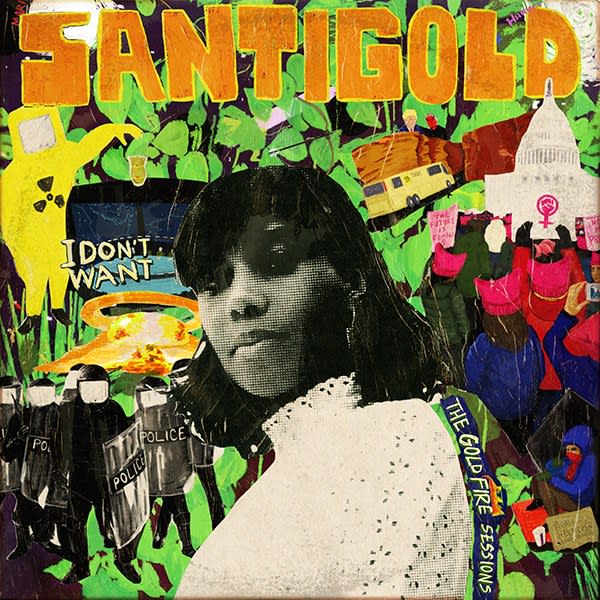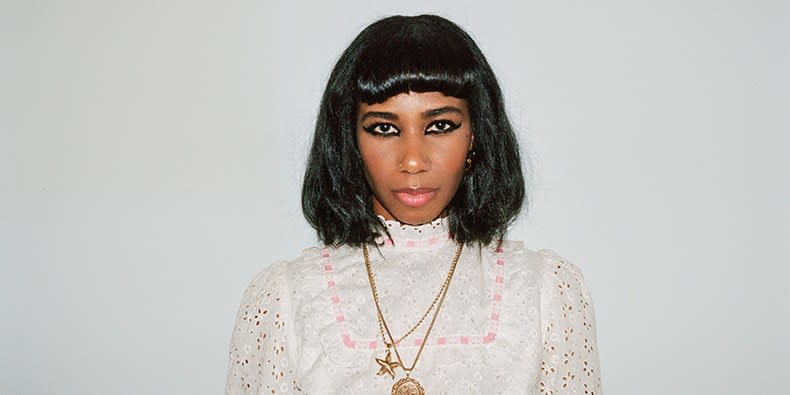Santigold on Her Surprise Dancehall Album, I Don’t Want: The Gold Fire Sessions
“Oh my god, it’s a scary-looking spider!!!” wails Santigold over the phone from her hotel room in Detroit. “Can you hold on for one second? I can’t relax.” Thuds in the background, followed by a low groan. “FUCK! I lost it! Wait, I see it…” More muffled clunks. “OK, it’s in a cup in the hallway. Now I’m focused and clear. We’re good,” she announces, panting with relief. Then she bursts into peals of laughter.
There is never a moment when Santigold doesn’t sound irrepressibly alive, whether she’s staring down a possible tarantula or singing truth to power with her infectiously catchy agit-pop. It’s been a decade since her debut LP Santogold, where, on “L.E.S. Artistes,” she howled one of this century’s most memorable meditations on the price of fame: “I can say I hope it will be worth what I give up/If I could stand up mean/For the things that I believe.” Yet the same freedom-fighting spirit burns through Santi’s latest, I Don’t Want: The Gold Fire Sessions, a laid-back dancehall mixtape made with Mixpak label don Dre Skull and set for an impromptu release tomorrow (July 27).
The album’s tropical opener “Coo Coo Coo,” for instance, is a middle finger to catcallers that ends with a twist: an unexpected key change and a message of love. Meanwhile, the closing title track “Gold Fire” is a call to arms against political apathy driven by rhythmic reggae guitar licks. The Gold Fire Sessions is a breezy, booty-shaking summer record that proves that Santigold has no shortage of compelling social commentary, even when she’s in poolside chill mode. After vanquishing the pesky arachnid, she spoke to me about the new album, why politics are wack, and learning to let go.
Pitchfork: What are you up to?
Santigold: I’m in Detroit, just sitting in my hotel room, thinking about how I need to eat and pump milk [laughs]. I’m doing some gigs with Lauryn Hill. Yesterday was the first one, so it was kind of a big deal. I just had twins four months ago, and I’ve been home all year—that was hard. This is my first time leaving the house, and my first show in a really long time. It was really exciting!
Congrats! Wait, so were you pregnant while recording this album?
I moved to L.A. from New York last July, and I made most of the record the week before I left. Right before the babies came, I was like, I should finish this. So I was recording myself nine months pregnant in a room. “Gold Fire” I did the week before I was due. But I got it done.
It seems like this album was more spontaneous than some of your previous releases. Were you writing these lyrics on the fly?
Lyrics with me are funny. Sometimes they come really fast, and I might write a song in ten minutes—that used to happen a lot, now it doesn’t happen so much anymore. If I can complete a song in two days, that’s fast.
Sometimes I get stuck on a song. When I wrote “Disparate Youth” [from 2012’s Master of My Make-Believe], it took me three months just to come up with the right words. I wrote the melody in one take, but sometimes I get stuck on a word because I want it to be the exact right thing. But this was different—quick, fun. A lot of songs on this record I wrote in the studio. I was thinking of it as a mixtape. The whole point was: These are the issues on my mind right now. Just throw it down. Don’t be too precious about the lyrics. That’s why I called it The Gold Fire Sessions, because it’s a collection of songs from the moment. “Gold Fire” is the name of one of those songs, and it’s about a burning fire inside that you can’t put out—a passion for fighting for what you believe in.
Were tracks like “Gold Fire” motivated by the political climate?
It’s not political. It’s more social commentary. Politics are wack—it’s mostly about the characters instead of the issues, like how religion is about religion instead of spirituality. But I think a lot of the issues playing out in politics right now are super relevant, and I care a lot about them. There's a song called “Coo Coo Coo”—it's a very feminist song about being annoyed when guys try to catcall you on the street. There are also a lot of songs that feel really light. It's a summer reggae record, too.
Let’s talk about “Crashing Your Party,” one of the more outspoken songs. What party are you crashing?
It wasn’t like a Democrat or Republican Party [laughs]. It’s more like, all you people who are not paying attention to what’s going on, break it up. It’s about those who prefer to not think about the issues playing out and instead put on blinders just to get through.
It’s also about women being super strong, having to step up and take on so much, and how the future is feminine. Also, being a mother and how hard that is. I’ve heard that the birth rate has declined so much in America because there’s so little support for working mothers.
Basically, it’s a cry to fight for what you believe in, what’s right. It’s not even one issue, it’s touching on so many things that are going on. Sorry I’m crashing your party—sorry I’m not going along with your agenda, what you’re selling.
I want to phrase this carefully as to avoid being yet another journalist asking a female artist, “What’s it like being a mother and a musician?!” But on this song, you say, “Here come the momma with her babies/You look right in her eyes know she courageous.” Do you think motherhood has changed the way you think about these issues you’ve long been talking about, because you’re fighting for your kids too?
Definitely. I’ve always cared about these issues. But, for instance, I just posted something on Instagram today, which I never do, but I was so gut-wrenched by this image of all the plastic in the ocean. It’s disgusting and sickening that we’re allowing this to happen to the earth.
It’s disheartening, frightening, and horrific to imagine that we could ruin the earth, and the future for our children and their children. We’re so short-sighted in our approach to everything on this planet. I’m really disappointing in human beings in a way. There’s been so much great work being done lately, but I’m very saddened by a lot of things going on in the world. As an artist, sometimes I feel a bit paralyzed because it’s so overwhelming.
Were these songs a way to work out of that paralysis?
It’s always cathartic for me to write music. The good thing is that music works on a spiritual and energetic level. People can feel stuff in a different way when it’s through music. If you can get some inspiration into a song, it might be received in a more impactful way than if you were just to have a conversation. I grew up listening to topical music—songs that were about things. So when I write songs, a lot of the time, they’re about the things weighing on my heart, that I want people to think about.
Who did you grow up listening to?
Old roots reggae—Bob Marley, Burning Spear, Black Uhuru, Steel Pulse, Marvin Gaye, Nina Simone… I listened to other stuff, like the Smiths, which was more introspective, honest, dark. I love that shit, too [laughs].
When did you get into dancehall?
We used to go to Jamaica every year when I was 10 until I was 16, and I started going on my own when I was 18. It felt like a second home for me. I remember being a little kid and buying these mixtapes of local music; they had some amazing stuff on it. This song called “50 Dollar Bill,” it’s like [sings], “All I want, is a fifty dollar bill…” [laughs] I remember thinking it was so cool.
I was really into Jamaican music—my dad played it in the house all the time. Then I was an African-American studies and music major in college at Wesleyan, so I learned about the history of music from an ethnomusicology standpoint. I studied a lot of Jamaican and African music and how they crossed over—how Jamaican music drew from African music. I’ve loved it for a long time, basically my whole life.

How did you and Dre Skull link up?
We met in a writing session for another artist. We just started talking: “Oh, you like this music? You like this song? Let’s do something together.”
What’s great about the album is that both of your styles mesh so well—I can hear some of him and some of you.
It was really fun. I found him so easy to work with. He has such good ideas and instincts. That’s what I wanted it to be: “I like you, you’re fun, you like the same music, so let’s do something really quick.” I think I’m going to keep doing that for a while, rather than focusing on big, whole projects. I don’t think people necessarily digest music in the same way. So I’m going to do fun stuff for a minute, a different way. I have another EP I’m about to do with someone else that’s going to be really fun and fast.
You also used some older material that you had made with Diplo, right?
When we were putting stuff together, I found songs I had on my computer that just fit the project perfectly. Some songs I had done with Ricky Blaze [the dancehall producer who worked on “Disparate Youth”] that I loved and never finished: “Run the Road,” “Crashing Your Party,” “A Perfect Life.” I wrote a musical movie a couple years ago, so I was trying to save those songs for that. But I never finished that… yet. So Dre brought those songs up to speed with the rest of the record. The Diplo song [“Valley of the Dolls”] is one he gave me a while ago. I had written just the chorus and never finished it. Dre worked on that too and made it all work.
Beyond the collaborative EP you mentioned, what are you hoping to do next?
You know… I’ve directed a lot of my videos and I want to direct more things other than videos. I’ve been playing around in that idea for a minute.
So maybe the musical movie will get made after all?
[Laughs] That’s definitely something I’m very interested in.

